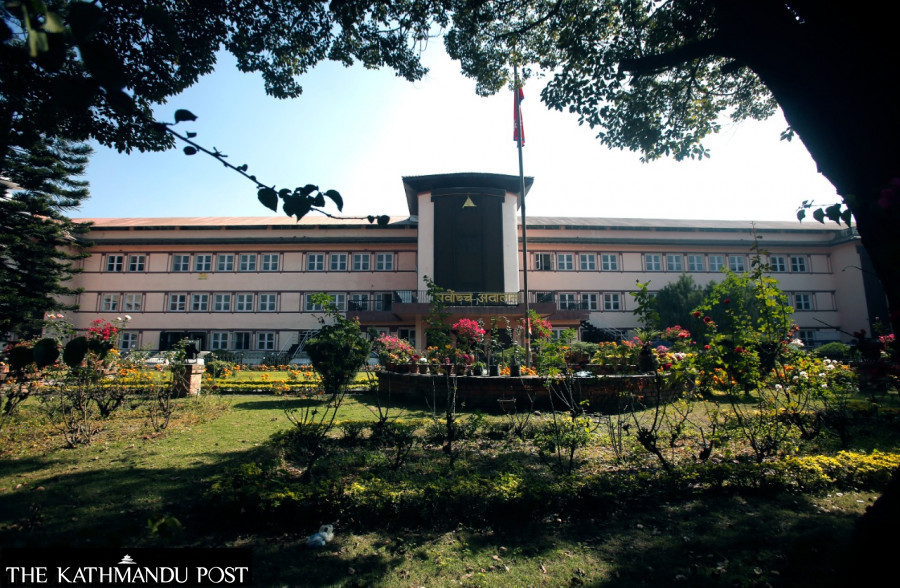National
Top court cautions executive against arbitrary pardons
Recommends assessing convict’s jail time, remorse and health status for presidential pardon eligibility.
Binod Ghimire
The Supreme Court has ruled that granting pardon or commuting jail terms of the convicts is not an absolute arbitrary authority of the executive. Issuing a full text of the decision to annul the granting of a presidential pardon to Yog Raj Dhakal, aka Regal, a murder convict affiliated with the Nepali Congress, the apex court has set different criteria that need to be adhered to before taking such a decision.
On the recommendation of the Cabinet, President Ramchandra Paudel had on the eve of the 8th Constitution Day on October 19 last year pardoned the remaining jail terms of 670 convicts, including Dhakal. In July 2015, Dhakal, a local Congress worker and gangster from Banke, had killed Chetan Manandhar using domestic weapons. He was convicted of the murder and given a 20-year jail term by the Banke district court in April 2018.
Dhakal had spent just eight years in jail while his remaining 12 years were pardoned. The government decision to pardon his remaining term drew widespread criticism.
Bharati Sherpa, then wife to Manandhar, had challenged the decision in the Supreme Court. A full bench of the court comprising justices Ishwar Prasad Khatiwada, Sapana Pradhan Malla and Kumar Chudal had on November 2, 2023 annulled the decision to grant pardon concluding that the decision was constitutionally and legally flawed. Dhakal was arrested immediately after the court order.
“Generally the convict must complete the jail term as prescribed by the judiciary,” reads the full text. “The jail term determined by the judiciary cannot be pardoned or commuted by the executive as its arbitrary prerogative.” The full bench has said the executive must consider whether the victims have consented, they have received compensation and have been integrated in society before taking such decisions.
The court has also asked to consider the duration the convicts have served in jail in proportion to their jail term and severity of crime before granting pardon. “It is necessary to take into consideration the age and health condition of the convicts, assurance of their good conduct while in jail and whether they have remorse for their wrong deeds before deciding to grant pardon or commute the jail terms,” reads one point of the verdict.
Every year, hundreds of convicts get pardon or commutations of their jail terms from the President on the recommendation of the government as per Article 276 of the Constitution of Nepal. The President may, under the law, grant pardons, suspend, commute or remit any sentence passed by any Court, judicial or quasi-judicial institution or administrative authority or institution, the article says.
A person who is sentenced by a court to jail for an offence can make a petition to the President through the Ministry of Home Affairs, for pardon, suspension, alteration or reduction of that sentence—based on which the government takes a decision.
The government now needs to abide by the criteria the court has set before taking decisions on pardon. Such decisions are generally taken ahead of Constitution Day and the Dashain festival, Nepal’s biggest.
Several such decisions have landed in controversy. On May 28, 2018, then President Bidya Devi Bhandari pardoned 816 convicts including Bal Krishna Dhungel on the occasion of Republic Day on the government’s recommendation. He was serving a jail term after being convicted of murdering Ujjan Kumar Shrestha from Okhaldhunga.
The Okhaldhunga district court had convicted Dhungel of murder in 2004, but in 2006, the Rajbiraj Appellate Court gave him a clean chit. The Supreme Court in 2010 overturned the appellate court’s decision and upheld the district court’s verdict.
The decision of President Paudel to grant amnesty to Tikapur massacre mastermind and former lawmaker Resham Chaudhary on the recommendation of Prime Minister Pushpa Kamal Dahal has also attracted controversy.
On May 20 last year, Sharada Kadayat Bohora, wife of a police official killed in the massacre, filed a writ petition challenging the decision. On June 7, a single bench of Justice Prakash Man Singh Raut issued an order seeking an explanation from the government as to why the amnesty was granted. The court has yet to pass a verdict on the petition.




 10.12°C Kathmandu
10.12°C Kathmandu















